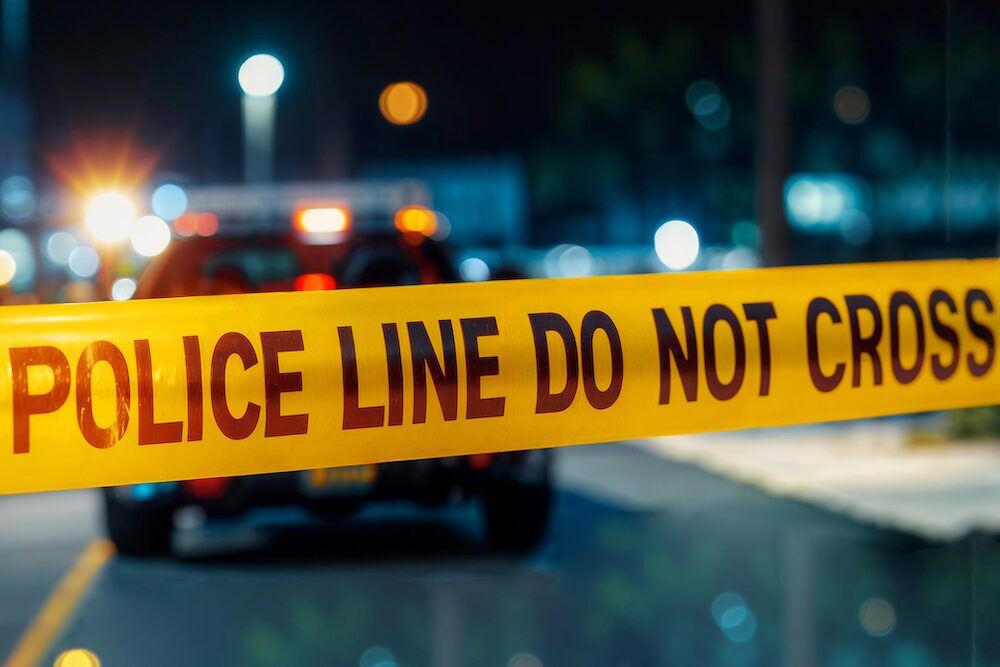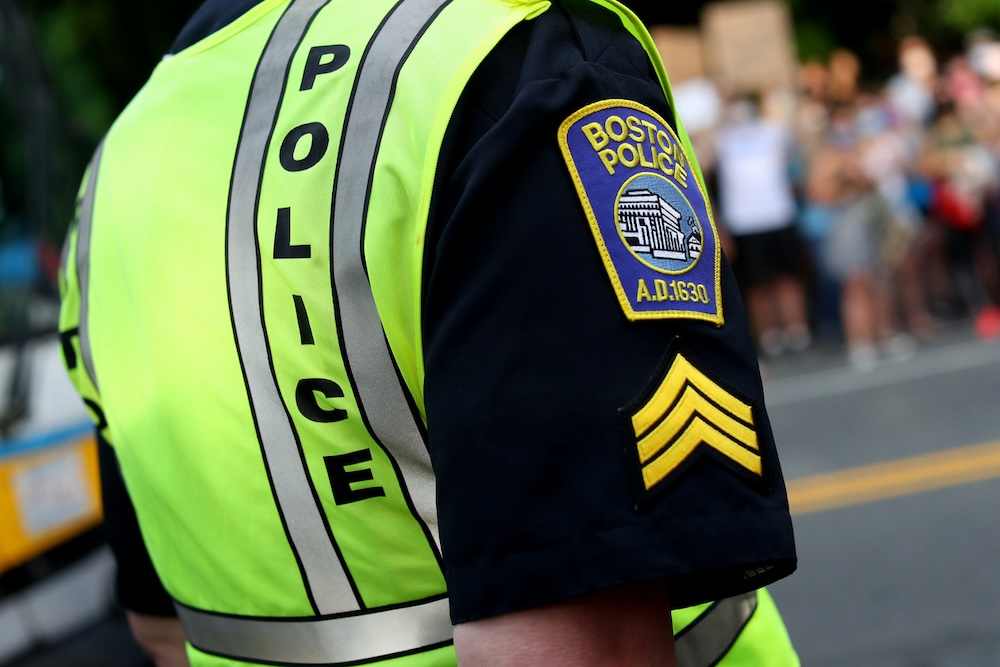
Some warn of political consequences for elected officials
by Brian Wright O’Connor
A celebration of Dominican cultural pride that started with a joyous parade in the heart of Boston’s Latino community was marred Sunday night with a burst of gunfire just outside of the festival grounds in Franklin Park.
The shooting, outside the perimeter of the Dominican Festival fairgrounds as the event was winding down – a tragedy beyond the control of festival organizers — left five people wounded.
But the incident also left many community members fuming over how a gathering meant to honor the heritage of music, family, and culture could be overshadowed, once again, by violence.
To some, including a number of Latino police officers, the hail of bullets fired into the crowd of revelers is just the latest symptom of what they say is lax enforcement of the law, especially towards youth offenders.
Some cops express frustration over an environment they say is rife with political correctness, where calls to aggressively enforce ordinances against public drinking, noise, unlicensed motorized vehicles face attacks from the civil liberties caucus and politicians more concerned about liberal votes than community safety.
To others, calls for hiring more police officers and cracking down on youth offenders overlook the reality that crime rates, broadly speaking, are dropping and that the complex causes of juvenile crime require more nuanced approaches, including greater access to mental health care and social services.
On the political front, two Boston city councilors with divergent views on public safety have come together to launch a citywide task force to air grievances and propose strategies to reduce both nuisances and felonies on the streets of the city. There is room, say both City Councilors Julia Mejia and Ed Flynn, to find common ground to protect public safety without returning to pre-George Floyd levels of police abuse of Black and Brown citizens.
They have been on opposite sides of votes on police funding and data-base security measures but are united on finding a broader consensus to reduce crime and fear in Boston.
The move towards an open debate comes as the annual Caribbean Carnival, touched by outbreaks of gun violence in recent years, prepares to kick off this coming weekend.
The Puerto Rican Festival took place in Franklin Park on the last weekend in July without any incidents despite what a key organizer said was a lack of an adequate security plan by Boston police.

The park, a green gem in the geographical heart of the city, has become a flashpoint for community concerns about what some see as rising youth disrespect for social norms.
During the warm-weather months, crowds of young people gather for “El Punto” parties at the Blue Hill Avenue entrance by Columbia Road or along American Legion Highway.
Ear-deafening music from loudspeakers in open trunks boom through adjacent neighborhoods. Kids on unlicensed and unregistered mopeds, dirt-bikes and ATVs race through the park byways. Alcohol is openly consumed as coils of marijuana and hookah smoke rise through the tree cover.
On festival days, the number of young people on the margins of the celebration swell into the hundreds, if not more, with the potential increasing for alcohol-fueled clashes between rivals.
Luis Matos, organizer of the Dominican Festival, said on El Mundo’s “La Hora del Café” livestream show that his team does their best to police their permitted area and clean up afterwards. But, he added, it’s the city’s responsibility to keep the outskirts of the festival safe and clean.
Matos said it’s tragic that families and senior citizens enjoying the music of legendary merengue stars Los Hermanos Rosario have to fear for their lives on a family day meant for hearing classic homeland melodies and dining on tostones beneath the Dominican flag.
The failure of the city to quell the summer-long drumbeat of loud parties and rowdy behavior inevitably leads to incidents even on weekends when no mass gatherings are held, say critics, who include Marilyn Rivera, president of the Puerto Rican Festival.
Appearing with Matos on “La Hora Del Café,” the El Mundo Boston morning livestream program, she said there is a disconnect between community residents and city leaders, especially some city councilors, who champion cutting funds and resources to a police department charged with keeping underserved neighborhoods safe.
“Once the community finds out their positions when it comes to public safety, they will lose credibility and votes because our people want more enforcement of the law, not less,” said Rivera, adding that the court system compounds the problem when prosecutors shy away from cases involving minors and the kids take advantage of it.
Among the most serious consequences of impunity often cited by critics was an incident that occurred on July 14, when a moped rider said to be coming from a Franklin Park party shot and killed a 35-year-old father of four, Andy “Jusepy” Baez Manan.
Manan, a softball player and coach, honked his horn at riders blocking his car near the Forest Hills MBTA stop and died in front of his children after a rider opened fire with a handgun. Police have made no arrests in the case.
“Every day, it’s more frightening and more dangerous,” said Yesenia Martinez, a mother of three who played on a team coached by Manan.
“The kids ride their motorcycles around. They drink. They smoke. And the police do nothing. Absolutely nothing. I have a son who is 17 and I’m scared when he goes into the street. It’s so dangerous.”
Sgt. David Hernandez, a 10-year veteran of the Boston Police Department who heads the Latino Law Enforcement Officers Group of Boston (LLEGO of Boston), said police feel caught in between community members who want better protection and politicians who want to limit resources, cut down on prosecutions of youth offenders and raise the age for defendants processed as juveniles rather than adults.
“The community today wants us there taking action but we’re not allowed to be there,” he said, citing not official policy but the atmosphere of distrust fostered, he added, by anti-police attitudes among some elected officials.
“Many people I know find it very difficult to vocalize that they want to be protected,” said Hernandez. “But they’re afraid to ask for more resources. They’re afraid of being a target of cancel culture. And what’s worse is that the loudest voices are not the majority voices. The majority want action against crime.”
Another Latino officer with 30 years on the Boston force echoed Hernandez’s comments.
“Community members are asking for one thing and elected officials for another,” he said, requesting anonymity. “We don’t feel we can do our job.”
A third police veteran said he felt frustrated by taking teenagers into custody – sometimes for serious felonies – only to be spit upon and attacked and later to watch them walk out of court without charges or with no bail. His views reflected the perception among many cops that since the national protests against police violence, “these kids have been giving cops the finger.”
While statistics show a downward trend in crime in Boston and around the country, high-profile incidents like the shooting last Sunday stoke fears of crime. At the same time, certain kinds of juvenile offenses are on the upswing. Gun arrests among youths went up 83% in Boston in 2022 and incidents involving weapons in the Boston public schools increased 44% between September 2022 and February 2023.
Boston police have been absent from the public school hallways since 2021. City Councilor Flynn wants them back. In contrast, City Councilor Mejia wants to give the school department time to implement their own programs to reduce threats to safe learning.
A survey by MassINC. showed that 86% of Latino parents want cops in the schools – the clearest indicator of a divide between community and political sentiment.
Advocates of armed officers under the school roof point to cities like Lawrence, where Mayor Brian DePena has welcomed a uniformed presence in at the high school with broad community support. Lawrence is more than 80% Latino.
When it comes to open public places like Franklin Park, the lines are less clearly drawn. No one endorses police ignoring violent felonies. But the range of solutions is broad in a city that Mayor Michelle Wu often lauds as the nation’s safest.
Police don’t have to make massive arrests to better contain festival crowds – they can simply enforce bans on public drinking, double-parking and lingering beyond the scheduled end-times of events, said Louis A. Elisa II, a park abutter and long-time member of the Franklin Park Coalition.
“When it comes to unregistered vehicles, noise, motorcycles, low-riders, illegal alcohol consumption, the police just have to work harder to do their jobs,” said Elisa. “They can tow cars, confiscate speakers and illegal motorized vehicles. This isn’t a matter of George Floyd over-reaction. Excessive policing and abusive policing are never acceptable. This is a matter of willingness to enforce the law.”
Flynn, a son of Southie who has built a reputation as a strong advocate for strong policing, and Mejia, an at-large councilor who has voted for cutting BPD funding, have taken a series of informal discussions around public safety and policing issues to a more formal level with the recent announcement of their task force.
Joined by Councilor Enrique Pepén, they plan to convene a group based on the model of the “Boston Miracle” – the successful effort in the 1990s to reduce Boston youth violence.
Mejia was part of that group, working in social services alongside representatives of law enforcement, the faith community, business leaders and prosecutors to address juvenile crime, especially among gangs, from every angle.
Their plan includes staging a town hall forum, open to all, to provide every resident a chance to offer their perspective.
That includes the offenders themselves. “Those who are part of the harm have to be part of the conversation if we want to make progress,” she said.
Simply hiring more police without making the force more culturally sensitive would be counter-productive, she said. “We need to do everything to ensure more cultural competence on the force,” said Mejia. The at-large councilor said educating parents is a key objective in making them better stewards of their children.
“Parents who grew up witnessing or being subject to domestic violence may lack the skill sets to be better parents themselves,” she said.
“You can’t legislate human behavior,” said Mejia. “When it comes to violence, you need all hands on deck – law enforcement, faith leaders, parents, non-profits. Everyone has to be a part of the solution.”
Flynn said he welcomed the collaboration with Mejia and her holistic approach to addressing crime and the fear of crime.
“Councilor Mejia has been very effective in reaching residents of Boston who haven’t been heard in politics and government,” he said. “Regardless of how we’ve voted, we both strongly agree that we have significant challenges in the city and that we need to listen to residents to implement change and improve the quality of life for all citizens.”
Still, one police officer we spoke to said that many on the city council, “simply don’t have our backs. They know who they are, but the community needs to know who they are too.”







